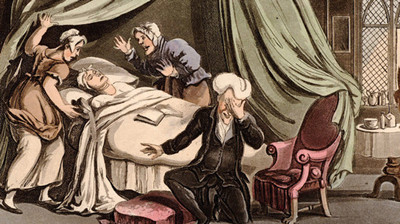家中安息
Home help
家庭援助
The government wants you to have a comfortable (and cheap) death
政府愿您安樂(又經濟)的告別人世
Still, it's better than hospital
家還是比醫院好
DEATH comes to all, but some are more sure of its timing, and can make plans. Kate Granger, a 32-year-old doctor suffering from an incurable form of sarcoma, has “very strong ambitions” for her last hours. She plans to avoid hospital emergency departments and die at her parents' house—music playing, candles glowing, family by her side.
每個人都會死,但是有些人卻更加清楚自己何時會死,且可以提前做好計劃。32歲的凱特·格蘭格是一位醫生,卻身患無法治愈的惡性腫瘤,她對自己剩下的時間有巨大的野心。她不打算死在醫院的急診室,而是她父母的房子—音樂為歌,燭光為舞,親人相伴。
Surveys show that over two-thirds of Britons would like to die at home. Like Dr Granger, they want to be with family and free of pain. Yet hospital remains the most common place of death. For some this is unavoidable—not every disease has as clear a turning point as cancer—but for others a lack of planning is to blame. The government, motivated by both compassion and thrift, wants to help.
調查顯示,三分之二的英國人都意欲在家面對死亡。就像格蘭格醫生一樣,他們想在親人身邊,免受病痛折磨。然而醫院仍舊是死神降臨最常見的地方。這在某種程度上是不可避免的—不是每種疾病都像癌癥一樣有一個明顯的轉折點—但是對其他疾病來說,缺乏規劃則應負主要責任。在同情心和節儉理念共同的驅使下,政府需要伸出援助之手。

In death, at least, public wishes align neatly with the state's desire to save money. The NHS has calculated that if roughly one more patient per general practitioner died outside hospital each year, it would save 180m ($295m). In 2008 it introduced a broad end-of-life care strategy, which sought to increase awareness of how people die while improving care. Since then the proportion of people dying at home or in care homes (the split is about half-and-half between them) has increased, from 38% to 44%.
至少在面對死亡時,公眾的愿望剛好和國家想要省錢的愿望結合在一起。英國國民健康保險制度已經大致計算出,如果每年每個普通醫師醫治的病人在原來的基礎上增加一個選擇死在醫院外面,就會節省1.8億英鎊(約合2.95億美元)。2008年,國家介紹了一個大范圍的臨終關懷方案,意欲在提升護理的同時增加人們對如何死亡的認知。自那時起,選擇死在家里或者老人院的人數(以上兩種情況大約五五開)已經從38%增加到了44%。
To steer patients away from hospitals, general practitioners have been encouraged to find their 1%—those patients likely to die in the next year—and start talking about end-of-life care. This can be difficult for doctors. “As a profession we view death as failure,” says Dr Granger. Yet when there is no cure to be had, planning for death can be therapeutic for patients.
為了引導病人們出院,普通醫師已經開始鼓勵找到那1%即將在下一年離世的病人,并且開始對他們采取臨終護理。對醫生來說這很困難。格蘭格說“作為醫生,我們將死亡看做失敗”。即使沒有什么治療方法,為死亡做好充分的計劃對病患來說也是有益的。
Those who do plan ahead are much more likely to have their wishes met. A growing number of patients have electronic “palliative-care co-ordination systems”, which allow doctors to register personal preferences so that other care providers can follow them. A paramedic called to a patient's home would know of a do-not-resuscitate order, for example. One study showed that such systems increase the number of people dying in their homes.
提前計劃的人更有機會實現愿望。越來越多的病人都有了電子“療養協調系統”,這使得醫生可以把個人喜好輸入系統,其他療養提供者可以按醫生囑咐執行。比如說護理人員給病人家里打電話,會了解到他們不愿再接受治療的愿望。一調查顯示,這個系統增加了在家死亡的人數。
But savings for the government may mean costs for charities and ordinary folk. At the end of life it is not always clear who should pay for what. Although Britons can get ordinary health care without paying out of pocket, social care is means-tested. People must often shell out for carers or care homes—or look after the terminally ill themselves. Disputes crop up over trivial things, like responsibility for the cost of a patient's bath.
但政府的存款可能要支付慈善機構和普通人的花費。生命走到盡頭,誰應該為什么付錢并不明了。雖然英國人可以不用掏腰包就獲得普通的醫療保健,社會福利仍然有待檢驗。人們必須為照護者或者養老院付錢—或者親自照顧末期病患。在小事上經常出現糾紛,比如病患洗澡的費用該由誰承擔。
A bill now trundling through Parliament would cap the cost of an individual's social care. Still, some want it to be free for those on end-of-life registries. That would cut into the government's savings—but allow more people to die as they want.
一項通過議會的議案可以覆蓋個人社會福利的費用。仍有一些人希望那些生命即將走到盡頭的人可以獲得免費的社會福利。這將會直接減少政府儲蓄—但也會讓更多人以自己想要的方式告別人世。譯者:張丹 校對:周雨晴












